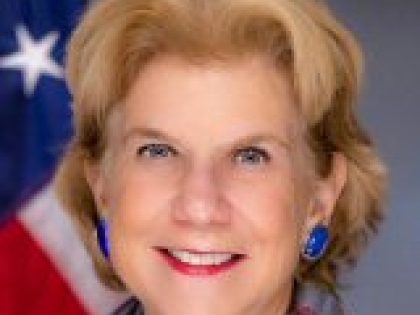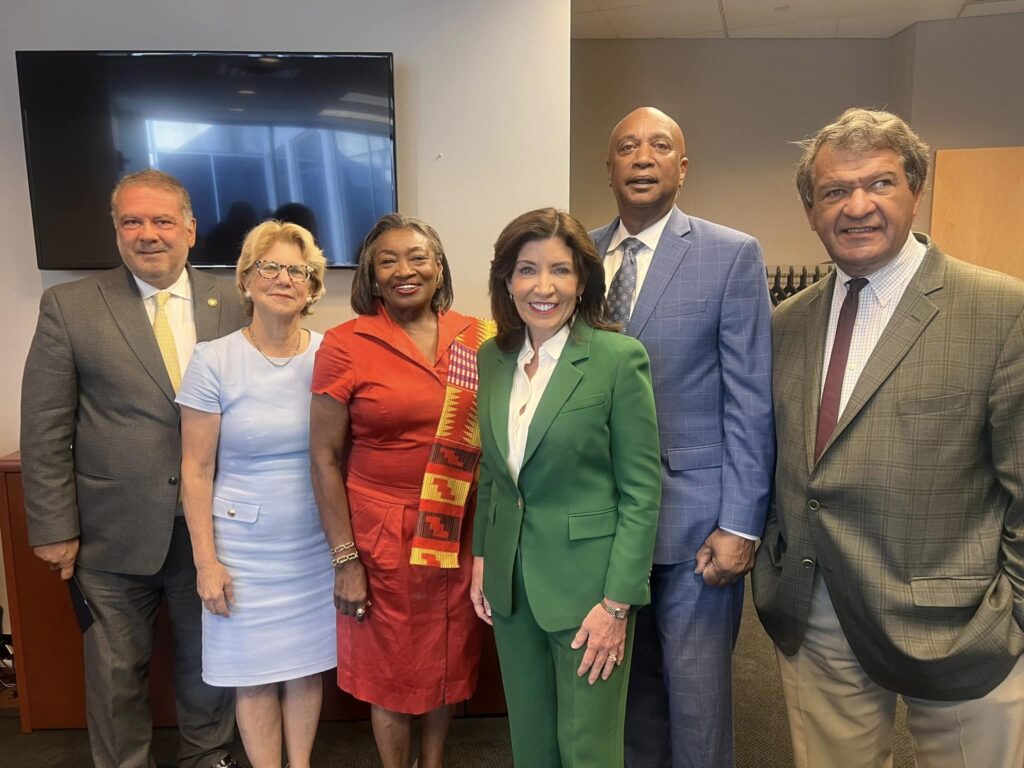
Yonkers Times: Gov. Hochul Visits Yonkers to Discuss Banning Cell Phones for Students During School
Dan Murphy
August 16, 2024

L-R-Mayor Mike Spano, State Senator Shelley Mayer, Senate Majority Leader Andrea Stewart-Cousins, Governor Kathy Hochul, Assemblyman Gary Pretlow, County Executive George Latimer
By Dan Murphy
On Aug. 5, Governor Kathy Hochul held a roundtable with local educators and stakeholders in Westchester as part of her statewide listening tour focused on addressing smartphone use in schools. Gov. Hochul’s “listening tour” across the state will help her develop a proposed statewide policy on smartphones in schools to be announced later this year. Any policy will not be in effect until 2025.
“Our young people can be successful in the classroom when they are learning and growing, not clicking and scrolling on the screen,” said Governor Hochul . “I have already learned a lot on this listening tour from educators and parents who want to deliver the best outcomes for our children. I am excited to continue working with all stakeholders to develop effective solutions to address the issue of smartphones and other devices in New York schools.”
According to a Pew Research survey released in June, 72 percent of high school teachers nationwide say student distraction with cell phones is a major problem in their classrooms. As part of her commitment to address this issue and create more positive outcomes for students, families, and educators, Gov. Hochul stated this spring that she plans to propose a statewide policy to address excessive smartphone use in schools.
Hochul added that many schools across the state currently have individual policies that seek to address cell phone use in their classrooms. We were not able to find a list of NY school districts that have banned student cell phones, but we four upstate; the Hoosick Falls SD, the Schoharie school district. the Newburgh School district high school and the Middletown School district.
The roundtable was held at the Yonkers Public Schools Board of Education and included State Senate Majority Leader Andrea Stewart-Cousins, State Senator Shelley Mayer, Yonkers Mayor Mike Spano, and County Executive George Latimer.
Senate Majority Leader Andrea Stewart-Cousins said, “We are here today with a shared goal of discussing how to best move forward to foster an educational environment that maximizes student learning and supports student mental well-being. I want to thank Governor Kathy Hochul for bringing together stakeholders to discuss how smartphone use in our schools impacts the learning environment and student mental health, and to explore potential ways to address this issue. Our work demands that we confront the challenges that arise in modern life, including the new opportunities brought by advances in technology.”
State Senator Shelley B. Mayer said, “I deeply applaud Governor Hochul for organizing this important roundtable and drawing attention to the challenges of cell phone use in schools. We had a productive conversation about how to combat children’s cell phone addiction to improve social interaction, mental health, and academic opportunities. Thank you to Governor Hochul and her team for convening this roundtable and to the City of Yonkers for hosting it.”
Mayor Mike Spano said, “The City of Yonkers and Yonkers Public Schools were proud to serve as the host City and District for this important roundtable. It’s critically important to gain perspective from all over the state about how this will impact the academic day, our students, our teachers, and our administrators. Technology has no doubt evolved and can be used to enhance learning, but it should not restrict our children from socializing and staying on task academically.”
Additional participants in the roundtable include:
Assemblyman Gary Pretlow
Assemblyman Nader Sayegh
Assemblyman Chris Burdick
White Plains Mayor Thomas Roach
White Plains Superintendent Joseph Ricca
Yonkers Associate Superintendent, Dr. Michelle Yazurlo
Yonkers Board of Education President Dr. Rosalba Corrado DelVecchio
Yonkers Federation of Teachers President and NYSUT General Board Member Samantha Rosado-Ciriello
Yonkers Council of State PTA President Dr. Robin Brumfield
While Hochul has yet to reveal any draft proposal or details of her plan, concerns have already been raised about who will pay for the cell phone pouches that students would be required to place their phones in when they come to school. State legislators want the state to pay the cost, while Hochul so far, has been non-committal on who would have to pay. The states of Pennsylvania and Delaware have allocated funds for school districts to use to pay for cell phone pouches.
Other education groups have called for the decision to ban cell phones in schools to remain in local control and come from local schools or school boards.
The States of Florida, Virginia, South Carolina, Indiana and Louisiana, and the Los Angeles school district, the second largest school district in the US, have already banned cell phone use by students in schools, and have either implemented the plan or will do so this school year.
The NY State United Teachers Union, and the NYS Parents Association, have both indicated support for Hochul’s plan. But some parents are already asking for their children to be allowed to use their cell phones during lunch recess. Other concerns about a ban are if some students use their cell phones for art classes, or for after school jobs.
Hochul is opposed to letting each school district decide whether to ban or not to ban cell phones. “It seems to me that a district-by-district approach does not work, and I don’t anticipate that a piecemeal approach will be my approach,” said Hochul.
Other concerns some parents have raised involve reaching their student-child during an emergency, including gun violence in school.
It is unclear if the ban would extend to SUNY college students.
Who will be responsible to enforce the ban is another unresolved issue, with teachers indicating that they don’t want to be the cell-phone police.